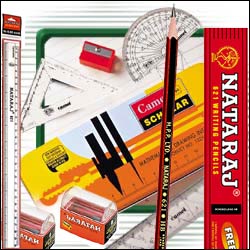 | « Back to article | Print this article |
 India's favourite stationary and art brand is set for a strategic makeover.
India's favourite stationary and art brand is set for a strategic makeover.
The Dandekar family, the promoter of Camlin Ltd, has decided to offload a lion's share of its stake to Japan's Kokuyo Co Ltd, according to two independent sources aware of the development.
Kokuyo is a 100-year-old stationary, furniture and design group with a $3-billion annual turnover.
The 80-year-old Camlin is known for pencils, pastels, inks and geometry boxes.
It has 2,000 products, from pencils and paint brushes to pastels, pens and permanent markers.
Kokuyo, listed on Japan's exchanges, will get a 51 per cent stake in Camlin through a series of staggered transactions.
Dilip Dandekar, Camlin chairman & managing director, denied any plan to sell the company.
"The information is not true. I would like to confirm that there is no such proposal," he said.
Mails to Kokuyo in Japan did not generate a response.
However, sources said the talks were in final stages and an announcement was expected in mid-May.
To begin with, the Dandekar family will sell a part of its 38 per cent stake and retain 12 per cent.
Initially, Kokuyo will hold around 25 per cent, but will have to make for an open offer to buy another 20 per cent.
Depending on the offer's success, a preferential allotment will be made to enable Kokuyo to take its stake to 51 per cent.
The deal, sources say, is being done at Rs 110-115 per share.
This means a valuation of two times Camlin's estimated 2010-11 sales of Rs 370 crore (Rs 3.7 billion) or 25 times its estimated 2010-11 earnings before interest, depreciation, taxation and amortisation.
Camlin shares closed at Rs 69.25 on the Bombay Stock Exchange on Friday.
The stock has been on fire of late on stake-sale buzz and risen 30 per cent in a month.
While three sections of the Dandekar family will exit, Dilip Dandekar and his nephew, Shriram S Dandekar, the executive director, will continue in non-executive roles, with the former becoming the non-executive chairman.
Sources said the deal's structuring was interesting.
As long as the Dandekar family remains a shareholder, it will have a put option on its stake.
However, Kokuyo will not enjoy a call option. In others words, Kokuyo will not have the right to buy additional shares from the family.
Also, Kokuyo will retain Camlin and Camel brands, especially in segments where Camlin already has a presence.
But Kokuyo may introduce own products such as Campus notebooks, Airofit scissors, Dotliner adhesive dispensers and its furniture line, as these will either be new products or brand diversifications.
There are many high-growth areas such as schoolbags and notebooks where Camlin is not present and Kokuyo's know-how is expected to help.
Together,